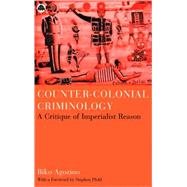
Note: Supplemental materials are not guaranteed with Rental or Used book purchases.
Purchase Benefits
What is included with this book?
| Acknowledgements | viii | ||||
| Foreword | xi | ||||
| Introduction | 1 | (12) | |||
| 1. The Enlightenment and Euro-American Theories of the Judicial Process | 13 | (27) | |||
|
16 | (6) | |||
|
22 | (4) | |||
|
26 | (9) | |||
|
35 | (5) | |||
| 2. From Determinism to Meaning: The Emergence of the Labelling Perspective | 40 | (10) | |||
|
42 | (2) | |||
|
44 | (1) | |||
|
45 | (1) | |||
|
46 | (1) | |||
|
47 | (3) | |||
| 3. From Societal Reaction to Questions of Power: From Labelling to Radical Criminology | 50 | (13) | |||
|
50 | (1) | |||
|
51 | (3) | |||
|
54 | (2) | |||
|
56 | (1) | |||
|
57 | (1) | |||
|
58 | (2) | |||
|
60 | (3) | |||
| 4. Feminist Perspectives and Critical Criminology | 63 | (12) | |||
|
64 | (2) | |||
|
66 | (6) | |||
|
72 | (3) | |||
| 5. Lesbian Rape: Maternal Metaphors for the Patriarchal State and International Conflict Resolution | 75 | (17) | |||
|
78 | (4) | |||
|
82 | (10) | |||
| 6. Poststructuralism and Positivism in Criminological Theory | 92 | (11) | |||
| 7. Social Fiction Sui Generis: The Fairy Tale Structure of Criminological Theory | 103 | (10) | |||
|
103 | (5) | |||
|
108 | (2) | |||
|
110 | (3) | |||
| 8. Executive Lawlessness and the Struggle for Democracy in Africa | 113 | (27) | |||
|
114 | (7) | |||
|
121 | (9) | |||
|
130 | (4) | |||
|
134 | (6) | |||
| 9. Radical Criminology in African Literature | 140 | (17) | |||
|
141 | (4) | |||
|
145 | (5) | |||
|
150 | (3) | |||
|
153 | (2) | |||
|
155 | (2) | |||
| 10. Committed Objectivity in Race-Class-Gender Research | 157 | (16) | |||
|
161 | (2) | |||
|
163 | (6) | |||
|
169 | (2) | |||
|
171 | (2) | |||
| 11. How Scientific is Criminal Justice? A Methodological Critique of Research on McCleskey v. Kemp and Other Capital Cases | 173 | (21) | |||
|
174 | (2) | |||
|
176 | (2) | |||
|
178 | (2) | |||
|
180 | (2) | |||
|
182 | (5) | |||
|
187 | (3) | |||
|
190 | (4) | |||
| 12. What is Institutionalised? The Race-Class-Gender Articulation of Stephen Lawrence | 194 | (20) | |||
|
197 | (5) | |||
|
202 | (2) | |||
|
204 | (3) | |||
|
207 | (4) | |||
|
211 | (3) | |||
| 13. Criminal Records: The Toughest, the Police and the Thieves: The Policing of Peter Tosh and Popular Culture | 214 | (14) | |||
|
215 | (2) | |||
|
217 | (3) | |||
|
220 | (3) | |||
|
223 | (5) | |||
| Conclusion: Beyond Criminological Orientalism | 228 | (19) | |||
| Bibliography | 247 | (19) | |||
| Index | 266 |
The New copy of this book will include any supplemental materials advertised. Please check the title of the book to determine if it should include any access cards, study guides, lab manuals, CDs, etc.
The Used, Rental and eBook copies of this book are not guaranteed to include any supplemental materials. Typically, only the book itself is included. This is true even if the title states it includes any access cards, study guides, lab manuals, CDs, etc.